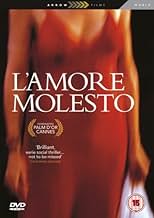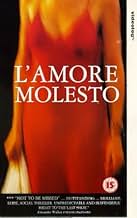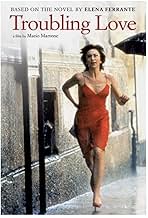Italian novelist Elena Ferrante (not her real name) entered Italy's literary Parnassus with the publication of her four volume work, the Neapolitan Novels, appeared between 2012 and 2015. Her writing was not only critically acclaimed but became immensely popular first in Italy and then abroad through translations. On her own admission, she decided to use a nom de plume as a safeguard to her privacy, since her writings are linked to personal experiences (there are some educated guesses as to her real identity, though).
This movie is based in her first novel L'Amore Molesto (1992); molestare may translate to "annoy" but another of its meanings is "molest" (in the sexual sense). Ferrante is also cowriter of the script together with director Mario Martone. Delia, the thirtyish protagonist makes a living in Bologna from drawing fumetti (comic strips). She lives alone and seems emotionally repressed. She receives a strange call from her mother Amalia, which she cannot make sense of, and shortly after she learns Amalia has died in mysterious circumstances, Delia travels to Naples to take care of funeral arrangements and to inquire into the events leading to her mother's death. In the course of her inquiries she reconnects with her father, an undistinguished painter, her uncle, and other characters that she had not seen since childhood: Caserta (not his real name) a man about town of dubious means of support, his son Antonio trying unsuccessfully to open a crack in Naples' moneyed/political class, a nosy neighbor of Amalia. As in real life, Delia's quest is nonlinear; there are false leads, frustrating digressions and she is forced to face childhood traumas that her subconscious had kept buried until then.
Out of this material, director Martone has assembled an atmospheric movie whose scenarios alternate between the drab interiors of formerly imposing buildings and Naples' lively, noisy and crowded streets. He is supported by the excellent cinematography of Luca Bigazzi. Acting is excellent all around, especially by Anna Bonaiuto playing Delia; she is on screen most of the time and conveys emotions (or lack thereof) by subtle gestures, This is not a typical movie thriller; at the end, not everything falls into place. Explanations are incomplete and a lot is left for the viewer to imagine, perhaps with several ways to join the dots, This may be taken as a criticism, but it also part of the movie's charm. A film worth watching.





















